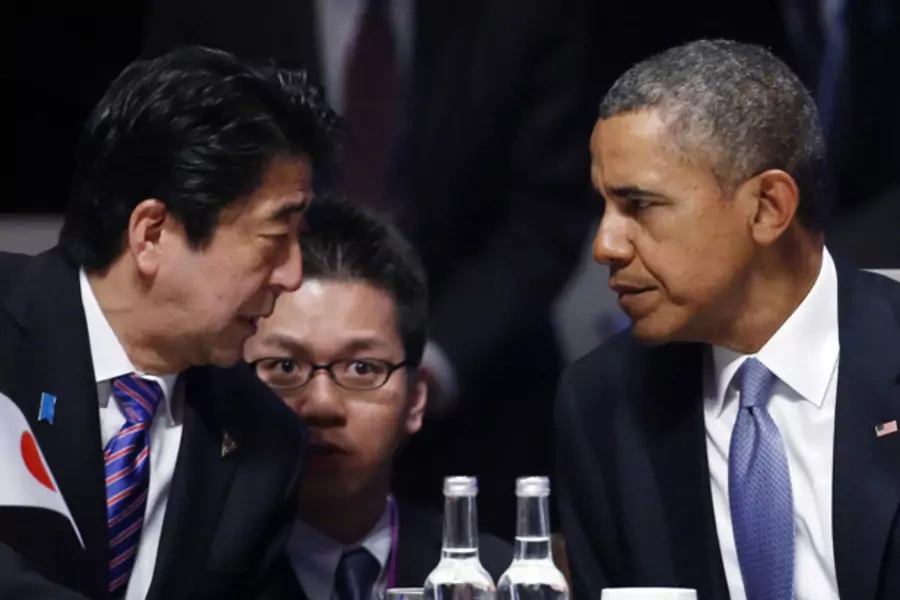Obama's Critical Moment on the Trans-Pacific Partnership (TPP)

More on:
What does President Obama actually want from the Trans-Pacific Partnership (TPP), his administration’s signature trade negotiation with 11 Asia-Pacific countries? During his visit to four countries in the region this week, we may finally get an answer to that question. And it says something about how closely he has played his cards on the issue that it’s rather hard to predict the outcome.
Wait, I hear some objecting. Of course we know what the president wants. He wants, as his National Security Advisor Susan Rice put it in a briefing Friday, a “comprehensive, high-standards regional trade agreement.” But hard as that is to say, it’s even harder to achieve. And the negotiations have reached the point where some difficult decisions--of the sort that only a president can make--are looming. Yet Obama has given few hints about how he might handle those decisions.
Consider just a few of the possibilities. An agreement with Japan, which is the first country Obama will visit, is the linchpin of the TPP. Japan’s participation is what takes the TPP from being a modest addition to the existing U.S. network of bilateral trade agreements in the region to a truly new animal, an ambitious regional deal that China may one day have no choice but to join. The United States and Japan together account for 80 percent of the economic output of the 12 TPP member countries. U.S. Trade Representative Mike Froman has been working tirelessly to try to conclude a deal with Japan, but huge issues remain. Japan wants to exclude agricultural products like beef, rice, pork, and dairy, and wants the United States to quickly eliminate its 2.5 percent tariff on car imports and its 25 percent tariff on light trucks, which keeps many Japanese-made SUVs out of the U.S market. The United States also wants Japan to eliminate an array of non-tariff barriers that block sales of U.S.-made cars and trucks.
President Obama faces some choices. He could demand an end to import barriers in Japan’s agricultural market, insisting that Tokyo go well beyond what Japan gave to Australia in their “economic partnership” agreement reached earlier this month. That would please farm state senators and congressmen, but could well force the Japanese government to quit the negotiations rather than face a domestic backlash. Or he could make a priority of the auto talks, demanding that Japan increase access for U.S. vehicles while insisting on a very slow phaseout of U.S. tariffs, much as he did to win the support of the United Auto Workers union for the U.S.-Korea Free Trade Agreement.
But the options are far more complex still. President Obama has repeatedly said, for example, that future trade agreements should set the highest possible standards on labor and environmental protection, in part to protect U.S. workers from unfair competition. But the United States is largely isolated in the talks on both issues. The president could ask for Japanese support for strong labor and environmental provisions in exchange for softening U.S. demands on agriculture and autos.
Or what about currency manipulation? Some Democrats in Congress have insisted that the TPP must contain measures to prevent governments from intervening in currency markets to hold down the value of their currency and gain an export advantage. Obama could ask for Japan’s support on the issue, and might get it since Tokyo has largely abandoned direct intervention in currency markets. But again, there would be a price to pay on other negotiating issues.
Whatever the president does, he will do with one eye on the Congress, where members of his own party are opposed to giving him the trade negotiating authority he needs to complete the TPP, and the Republicans are willing only if enough Democrats sign on. If Obama pushes too hard on Japan, a deal may be impossible, but if he does not bring home enough then his currently slim chances in Congress will become even slimmer.
The president has so far managed to remain above the fray, leaving the difficult negotiations to others in his administration. But if he truly wants to finish the agreement, and make the TPP part of his presidential legacy, he has no choice but to get his hands a bit dirty. And there’s no time to start like the present trip.
More on:
 Online Store
Online Store